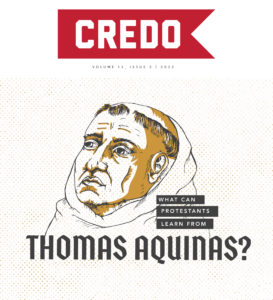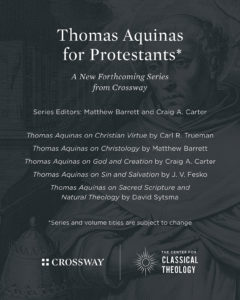
Misrepresenting Aquinas with Prejudice
The latest issue of C redo Magazine focuses on Thomas Aquinas. The following is one of the issue’s featured columns by Richard A. Muller. Dr. Muller is Senior Fellow at the Junius Institute for Digital Reformation Research, as well as the P. J. Zondervan Professor of Historical Theology, Emeritus at Calvin Theological Seminary.
redo Magazine focuses on Thomas Aquinas. The following is one of the issue’s featured columns by Richard A. Muller. Dr. Muller is Senior Fellow at the Junius Institute for Digital Reformation Research, as well as the P. J. Zondervan Professor of Historical Theology, Emeritus at Calvin Theological Seminary.
Scott Oliphint’s highly negative verdict on the thought of Thomas Aquinas demands some response if only because of the need to have, in Reformed circles, the balanced understanding of Aquinas’ theology and philosophy that Oliphint fails to provide. It is a fairly consistent refrain throughout Oliphint’s book, Thomas Aquinas (P&R, 2017), that Aquinas failed in an attempt to “synthesize ‘purely’ philosophical with theological principia“—failed because “the two principia cannot be merged” (p. 124). These “ultimately incompatible principia” are, according to Oliphint, “the neutrality of natural reason … and the truth of God’s revelation” (p. 126). I propose to take up the two questions that are the focus of Oliphint’s book, the problem of knowledge, specifically knowledge of God; and in a second part of the review, Aquinas’ understanding of the analogy of being, the proofs, and the relationship of divine simplicity to the Trinity. Concluding comments will follow as a third part.
The Knowledge of God
Oliphint rests his examination of the praeambula fidei on Ralph McInerny’s recent study as if McInerny argued that the preambles, namely, the proofs of Thomas’ Summa, are autonomous “purely philosophical” arguments, products of “pure nature” (p. 79, n63), “outside the realm of theology,” viewed by Aquinas as necessary “in order properly to assess the knowledge of God” (pp. 25-26, 27). What McInerny actually says is that “It is obvious that the phrase ‘preambles of faith’ is one devised and used from the side of belief; it is the believer who compares truths about God that he holds only thanks to the grace of faith and those truths about God that philosophers come to know by way of demonstrative proof.”1 This is a very different reading of Aquinas than Oliphint’s claim that “Thomas thinks that natural reason forms the foundational structure of which revelation is the superstructure” (p. 13). Oliphint is mistaken in his reading of Thomism as attempting to merge the antithetical “principia” of a neutral “natural reason” and the truth of revelation.Aquinas is not segmenting off rational from revealed truths: rather he is placing his entire rational presentation within the compass of sacred doctrine. Click To Tweet
When Aquinas makes his distinction between those truths concerning God that can be known through human reason and those that exceed the capability of reason and must be known by revelation, he is not segmenting off rational from revealed truths: rather he is placing his entire rational presentation within the compass of sacred doctrine which deals with God “not only so far as he can be known through creatures just as philosophers knew him … but also so far as He is known to himself alone and revealed to others.”2 Aquinas did not view truths of reason and truths of revelation as incompatible or in need of synthesis. Underlying the theological project of Aquinas’ two Summas is the assumption that what is true is true whatever its immediate source, given that all truth ultimately comes from God who is true. Aquinas’ project is not an attempt to synthesize incompatibles.
T he basis for this particular misinterpretation appears in Oliphint’s definition of duplex veritatis modus, incorrectly rendered as “truth in two ways” and “double ways of truth.”3 “Modus” is nominative singular–with the result that the term indicates one “twofold way” or “twofold mode” of truth and not two ways of truth. The mistranslation is probably what leads Oliphint to confuse duplex veritatis modus with duplex veritas or “double truth.” Oliphint goes on to comment “that it is possible for something to be true in philosophy but false in theology, or false in theology but true in philosophy,” namely, double truth (p. 129). Aquinas affirms a twofold way of knowing truth about God–but he denied double truth. From Aquinas’ perspective, reason teaches that God exists (which is true) and revelation teaches that God exists (which is true): there is no incompatibility between the rational and the revealed truth, because it is the same truth, but in the case of revelation in a different “mode” because from a higher, clearer source.Aquinas did not view truths of reason and truths of revelation as incompatible or in need of synthesis. Click To Tweet
he basis for this particular misinterpretation appears in Oliphint’s definition of duplex veritatis modus, incorrectly rendered as “truth in two ways” and “double ways of truth.”3 “Modus” is nominative singular–with the result that the term indicates one “twofold way” or “twofold mode” of truth and not two ways of truth. The mistranslation is probably what leads Oliphint to confuse duplex veritatis modus with duplex veritas or “double truth.” Oliphint goes on to comment “that it is possible for something to be true in philosophy but false in theology, or false in theology but true in philosophy,” namely, double truth (p. 129). Aquinas affirms a twofold way of knowing truth about God–but he denied double truth. From Aquinas’ perspective, reason teaches that God exists (which is true) and revelation teaches that God exists (which is true): there is no incompatibility between the rational and the revealed truth, because it is the same truth, but in the case of revelation in a different “mode” because from a higher, clearer source.Aquinas did not view truths of reason and truths of revelation as incompatible or in need of synthesis. Click To Tweet
It is also does not follow from the absence of a discussion of the noetic effect of sin in Aquinas’ praeambula that the issue was not broached and understood in his theology. One need look no further than Aquinas’ Summa theologiae to find that he views “weakness, ignorance, malice, and concupiscence… as wounds of nature consequent on sin” and that he explicitly indicates that these wounds were “inflicted on the whole of human nature as a result of the first parent’s sin”: reason is “deprived of order” and wounded with “ignorance” and “obscured, especially in practical matters.”4
Moreover, in the very argument that Oliphint cites from Aquinas’ Commentary on the Gospel of John as a basic statement of Aquinas’ view of the powers of natural reason,5 Aquinas also comments on the phrase “the world did not know him” (Jn. 1:10) to the effect that “this lack is attributed to man’s guilt.”6
Aquinas’ exposition of Romans 1:19-20, moreover, is much like that of Calvin, Vermigli, and various of the Reformed orthodox: there is knowledge of some truth concerning God among the Gentiles, to the end that they are left “without excuse” in their ungodliness.7 This limited knowledge of God cannot indicate “what God is [quid est Deus]” inasmuch as it arises only from the light of reason and sense knowledge–although such aspects of God as his goodness, wisdom, and power can be known.8 In their guilt, human beings fail to use the knowledge of God that they have and with “perverse reasoning” change true knowledge of God into false teachings.9 Contra Oliphint, Aquinas has not “wholly misread and misunderstood what Scripture is arguing” (p. 44). Aquinas' exposition of Romans 1 is much like that of Calvin, Vermigli, and various of the Reformed orthodox. Click To Tweet
The problem is most apparent in Oliphint’s highly selective use of Aquinas’ commentary on John 1:9, which leaves out the portions that undermine his argument. Aquinas indicates that human beings are enlightened by “the light of natural knowledge,” which insofar as it is light is such by participation in the “true light,” which is the Word. He adds, “If any one is not enlightened, it is due to himself, because he turns from the light that enlightens.”10 Aquinas also distinguishes this true light, given to all by God, from which human beings turn away, from the “false light” which “the philosophers prided themselves on having,” citing Romans 1:21.11 Despite what Aquinas says quite clearly, Oliphint concludes, “We should make it clear here that Thomas does not think that the ‘enlightening’ of which John speaks necessarily includes divine truth or content” (p. 15).
For Aquinas, reason, “the light of nature,” is itself a gift of God to human beings in the original creation of humanity that is capable of knowing not only that God exists, but that God is good, wise, and powerful. Where reason falls short, because of its finitude, its rootedness in sense perception, and the errors brought about by sin, is that, without the aid of revelation, it cannot know the truths of salvation. This “Thomistic” assumption should have a familiar ring in Reformed circles. It is paralleled by the very first sentence of the Westminster Confession—as also by the second article of the Belgic Confession, and Calvin’s commentary on the passage. Oliphint’s claim that Aquinas’ reading has “no basis” in the text of Scripture becomes an indictment of Calvin and the Reformed tradition as well.This Thomistic assumption should have a familiar ring in Reformed circles. It is paralleled by the very first sentence of the Westminster Confession. Click To Tweet
The Analogy of Being
Oliphint’s discussion of Aquinas’ view of God draws heavily on the claims of Cornelius Van Til, one of whose basic points of critique is that Aquinas’ “idea of the analogy of being compromises the biblical doctrine of creation.”8 In Van Til’s view, the notion of an analogy of being comes directly from Aristotle and reduces the distinction between the Creator and the creature by adopting the Greek philosophical assumption that “all being is essentially one” and that “all individual beings are being to the extent that they participate in this one ultimate being.”9 What Van Til missed is that if Aquinas assumed “all being” is “essentially one,” he would have had no need for analogy and simply identified the same attributes in God and in human beings as predicated univocally. But since Aquinas clearly affirms the Creator-creature distinction, resting on creation ex nihilo, he argued for non-univocal, namely analogical predication. Failure to understand the connection between Aquinas’ understanding of analogy and his doctrine of creation is also characteristic of Oliphint’s critique.
Oliphint also makes several crucial mistakes in his interpretation of Aquinas’ proofs of the existence of God. He dismisses Aquinas’ use of Exodus 3:14 as insufficient to show the Christian context in which the proofs are deployed on the rather slim ground that, had Aquinas really intended to be biblical, he would not simply have cited the verse he would have “shown how the content of revelation grounded his arguments” instead of proceeding by “natural reason.”10 But citation of texts, presumably interpreted exegetically elsewhere, is a common practice, and this understanding of Exodus 3:14, rooted in Augustine,was a commonplace—not, by the way, available to “natural reason.”
Nor is the citation of Exodus 3:14 the only indication of a theological and biblical backdrop to the proofs: in the first article, on whether the existence of God is self evident, Aquinas bases his argument with an objection drawn from John of Damascus’ De fide orthodoxa and John 14:6–and then counters the objections with a point from Aristotle’s Metaphysics interpreted by way of a reference to Psalm 52:1. In the second article, whether it can be demonstrated that God exists, draws objections from Hebrews 11:1 and from John of Damascus, countering them with a citation of Romans 1:20. Then, when Aquinas poses the question leading to the proofs of whether God exists, he offers no references in his objections and counters them with Exodus 3:14. The process of argument is on the basis of reason, but the argument with the objectors is an argument among Christians.Cornelius Van Til is by no stretch of the imagination a competent analyst of the thought of Aquinas. Click To Tweet
The second mistake is also categorical one: it concerns the issue of precisely what Aquinas thought he was proving. Oliphint represents Cajetan as teaching that the “proofs only demonstrated properties that could apply to a god, but not to God himself,” (p. 90, n77) but what Cajetan actually held was that the proofs do not demonstrate the existence of God “per se” but “quasi per accidens,” his point being that the proofs establish properties that, as Aquinas himself put it, “everyone understands to be God.”11 These are not merely possible properties of “a god”—they are the presumed properties of the one and only God.
Another mistake concerns Oliphint’s reading of Aquinas’ cosmological proof. Oliphint draws on Stephen Davis to argue that “for any version of the cosmological argument to work, the conclusion must presuppose some aspect of temporal causality” and concludes that since Aquinas’ does not place God into a temporal sequence, Aquinas’ proof fails (p. 81). Aquinas, however, assumed creation ex nihilo and that there is no time, finite or infinite, before the moment of creation. Aquinas’ view of the impossibility of an infinite sequence of causes, therefore, does not rely on temporal sequence but follows precisely what Davis assumed might produce a valid argument, namely, an essential or ontological sequence of the hierarchy of causes in which contingent being (even if it were in an infinite temporal sequence) is not sufficient to explain its own existence.12 Indeed, contra Oliphint, Davis concludes that Aquinas rightly recognized that “No hierarchical causal series can regress infinitely; it must have a beginning.”13

